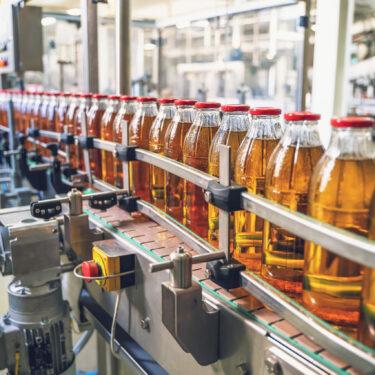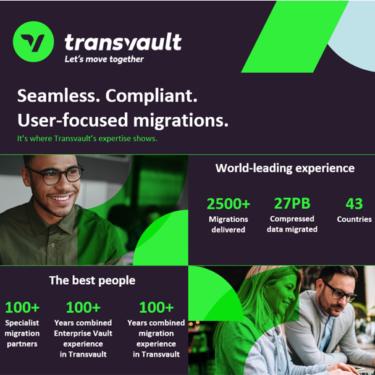NXP – Short Circuit to the Cloud
Manufacturing
Innovative semi-conductor manufacturer moves 40TB of legacy email archives as it switches its core IT systems into Office 365

Across the manufacturing spectrum, the demand for improved agility, consistent quality, security, resilience and sustainability is driving change. From electronics, apparel and robotics to aerospace, plastics and food, the need is the same. To enable this change, manufacturing companies are looking to harness the power of technology to create a roadmap towards digital transformation. Given the challenges faced by the manufacturing sector, this is no longer an option, it is now a business imperative.
At Transvault, we understand how important digital transformation is for manufacturers, and the steps they should take to success. One of the most important steps is email archive migration. More than 180 manufacturing companies have trusted us to migrate their email archives with a seamless transition to their new cloud platforms.
We understand that manufacturers are concerned about disruptions to users, cyber security, losing sensitive data and meeting compliance requirements. At Transvault we have the experience and ability to ensure the email archive migration process runs smoothly. In this blog we explain how.
From lowering the cost of production and being faster to market, to improving supply chain integrations and enhancing data management, there are a multitude of reasons why manufacturers are moving towards digital transformation.
Since Industry 4.0 first heralded the introduction of the new digitalised era for manufacturing, companies have been transitioning at pace with the aim of future-proofing their business. As a result, the market is growing. Research suggests that the global cloud-based manufacturing sector will reach $131.5 billion by 2022 at a CAGR of 22.9%. And while initially many organisations chose to take a hybrid-cloud approach, more are now leaving behind on-premises technology in favour of a cloud-first model.
Read more on how email archive migrations are a key part of a digital transformation roadmap for manufacturers.
In manufacturing, it is primarily corporate systems that are being migrated onto the cloud, with some operational systems gradually being moved across. Manufacturing businesses indicate that this provides:
Find out how Transvault helped a large manufacturing company migrate 40TBs of data to Microsoft Office 365.
As manufacturers commit to Net Zero, their digitalisation efforts will also contribute positively towards environmental sustainability. Increasing efficiencies across all aspects of the business and throughout the product lifecycle will lower carbon emissions and optimise energy efficiency.
Recent supply chain disruptions only serve to highlight the vulnerability of production and manufacturing processes.
However, the traditional supply chain is undergoing significant change, and this will allow issues such as the global shortage of silicon chips to be quickly resolved.
Amongst the advantages of digital transformation in manufacturing supply chains are:
While adopting digital technology can bring so many advantages, that doesn’t mean the road to transformation is always easy. The impact of digitalisation on manufacturing is so great that it is described as the fourth industrial revolution, or Industry 4.0. It represents a step-change in how manufacturing moves from the introduction of computers to the prospect of smart systems that require no human involvement and rely instead on robotics, IoT and automation.
The cloud has become integral to this revolution, storing data and optimising equipment and operations. However, moving to the cloud necessarily means moving away from legacy IT systems. Long established manufacturers have found this more challenging because they are encumbered with technical debt from their on-premises hardware. This can delay the process of digitalisation. Some have chosen to take a step-by-step approach, assessing the benefits of each technology they deploy first before moving to the next.
Other roadblocks identified by manufacturers in migrating to the cloud include:


Transvault has pioneered the migration market space and has produced a benchmark whereby all migration companies are measured.
Despite these concerns, digital transformation is essential for the manufacturing sector. This is because organisations cannot afford the luxury of continuing to operate in the same way they always have if they want to survive, let alone compete.
While transformation can be daunting, it can also be liberating. The process of moving applications and all the data you hold onto the cloud, will provide:
Why now? Because in the wake of the global pandemic with pressure on supply chains, manufacturers need to be resilient and agile enough to accommodate shifts and shocks and maximise opportunities to re-emerge stronger than before.
An essential element of digital transformation in manufacturing is the smooth migration of communication and collaboration tools that all organisations rely on, particularly if teams are working across multiple geographies or sites. For many manufacturers this will mean moving their entire email archive.
Manufacturing companies already using Microsoft 365 have an advantage. In terms of security, significant resources have been built into the Microsoft 365 cloud environment to ensure users are protected from threats. Because it provides access to all data in one place, it can supply valuable insight enabling decisions to be made more quickly, innovations to be scaled, and the workforce to be upskilled. In addition, unlike with on-premises systems or third-party solutions, Microsoft 365 will be automatically updated with compliance policy changes relating to emails and will alert manufacturers if they need to act.
At Transvault, we can help you migrate your email archive to Microsoft 365. Our specialist partners and services team provide expert coordination and a proven cloud-agnostic approach which is secure, robust, adaptable and extensible.
Because we have worked with many manufacturers, we have the experience to make the process of migrating email archives easy. From the straightforward to the uniquely complex, Transvault has successfully migrated large volumes of data. This means we understand the key questions that will be asked:
Over 15 years of experience gives us a unique perspective on the challenges and benefits of email archive migration as part of a broader digital transformation strategy. We have worked with manufacturers of all sizes and our technology has been proven to deliver success time after time.
We understand that it is always helpful to hear about other companies’ experiences, and this case study illustrates how one customer moved 40TB of legacy email archives as it switched its IT systems to Office 365.
In this blog we have outlined why digital transformation is gathering pace in the manufacturing sector, the importance of the cloud, and why email archive migration to the cloud is a crucial element in delivering ‘access anywhere’ capabilities to organisations.
We understand that every manufacturing company is different and what they need to support a smooth transition from beginning to end is a tailored approach. Transvault is the ideal partner to provide this support.
Contact our team today on 648 808 0407 or email us info@transvault.com to discuss your cloud migration
Also, please find more information on how we support email archive migrations in the manufacturing sector.
Need help planning your migration?

Manufacturing
Innovative semi-conductor manufacturer moves 40TB of legacy email archives as it switches its core IT systems into Office 365

Infographic highlighting why Transvault is the best choice for your email archive migration.